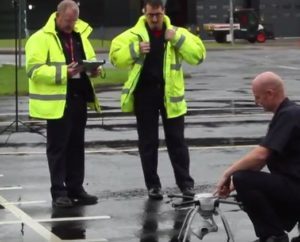
England may be leaving Europe, but their police agencies won’t be leaving drone technology any time soon. The Lancashire Fire and Rescue recently released a video demonstrating the capabilities of the department’s new crime-fighting drone.
“[The drone will be] an extra tool when it comes to tackling offenders, protecting the public and responding to major incidents,” said Chief inspector Gary Crowe in a press release.
The department spent around $13,000 on the drone system, courtesy of money seized by criminals. In other words, convicts of the past may, ironically, help catch thugs of the future.
“Being able to call upon the drone to provide real-time footage will save vital time, provide officers the information they need to make potentially lifesaving decisions and be significantly cheaper to operate than the police helicopter,” said Crime Commissioner Clive Grunshaw.
In Oregon, a retiring police pilot prefers to look to the future rather than his own past when it comes to search-and-rescue.
Paul Ehrhardt, the founder of the Benton County Sheriff’s Office Air Search and Rescue American Volunteer Group, is helping the department deploy a DJI Phantom 4 even as his piloting career prepares for a smooth landing.
At 68, Ehrhardt says he’s ready to retire and bring in search-and-rescue drones to help prevent loss of life of pilots, who have in the past had to fly into dangerous skies.
“Being a pilot, I was kind of anti-drone for a while,” he said in a recent interview with the Corvallis Gazette-Times. “I think we can use this thing to keep our pilots safe, and that’s a lot more important,” he added.
The volunteer aerial unit works with the sheriff’s office to help locate crashed aircraft, conduct SAR missions and survey wildfires. The pilots use a small Cessna airplane and helicopter.
“There are a lot of times when it’s just too dangerous to put a plane in the air but we’ll still need to look for someone,” he said. “If I have it, I can send up a drone, and if the worst happens, I lose a drone. No big deal. At least we won’t have lost a person.”
Jason is a longstanding contributor to DroneLife with an avid interest in all things tech. He focuses on anti-drone technologies and the public safety sector; police, fire, and search and rescue.
Beginning his career as a journalist in 1996, Jason has since written and edited thousands of engaging news articles, blog posts, press releases and online content.
Email Jason
TWITTER:@JasonPReagan
Subscribe to DroneLife here.